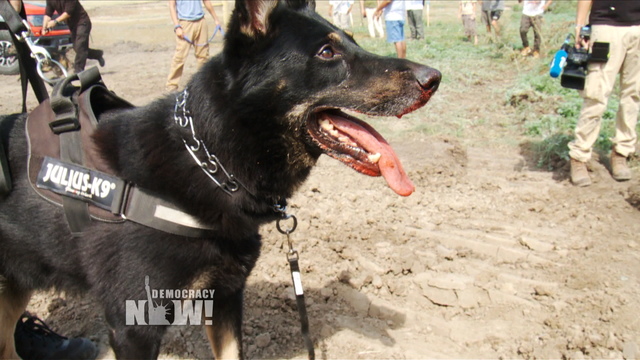tyroneweaver
Platinum Member
Keystone would have been much better
Violent scenes at North Dakota oil pipeline as protesters claim sacred burial grounds were destroyed by construction crews
A protest against a four-state, $3.8billion oil pipeline turned violent on Saturday after tribal officials say construction crews destroyed Native American burial and cultural sites on private land in southern North Dakota.
Morton County Sheriff's Office spokeswoman Donnell Preskey said four private security guards and two guard dogs were injured after several hundred protesters confronted construction crews at the site just outside the Standing Rock Sioux reservation.
One of the security officers was taken to a Bismarck hospital for undisclosed injuries. The two guard dogs were taken to a Bismarck veterinary clinic, Preskey said.
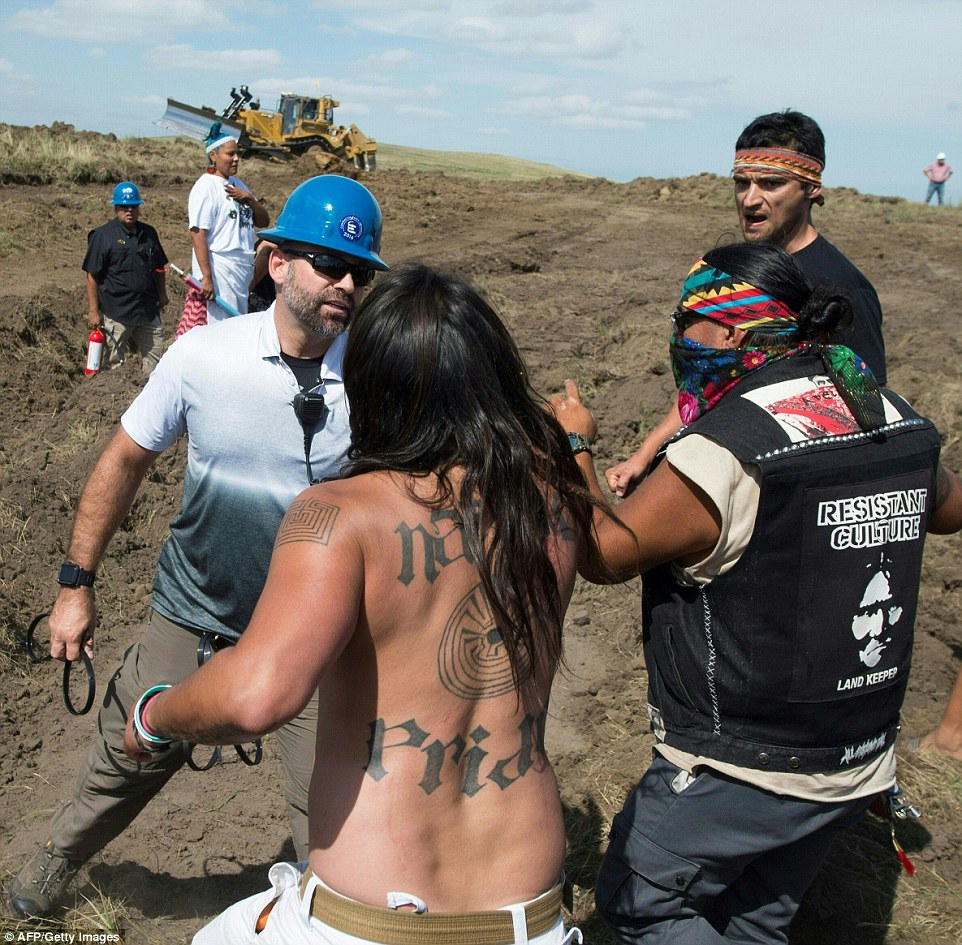
Security agents (left in blue helmet) confront protesters on the worksite for the Dakota Access Pipeline (DAPL) oil pipeline, near Cannonball, North Dakota, on Saturday.
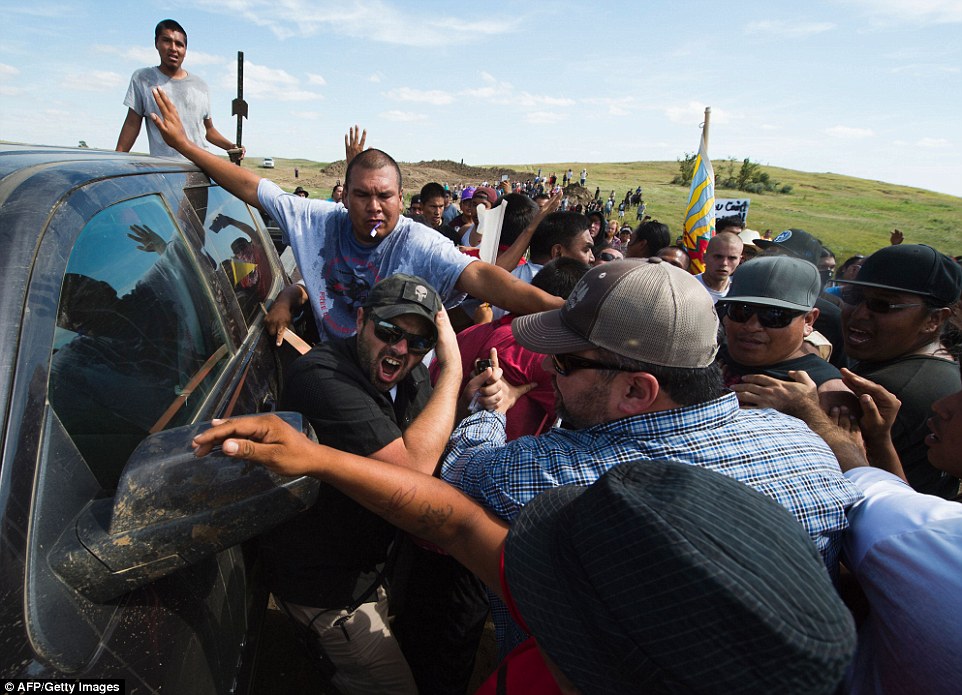
Native American protesters and their supporters clash with security guards just outside the Standing Rock Sioux reservation.
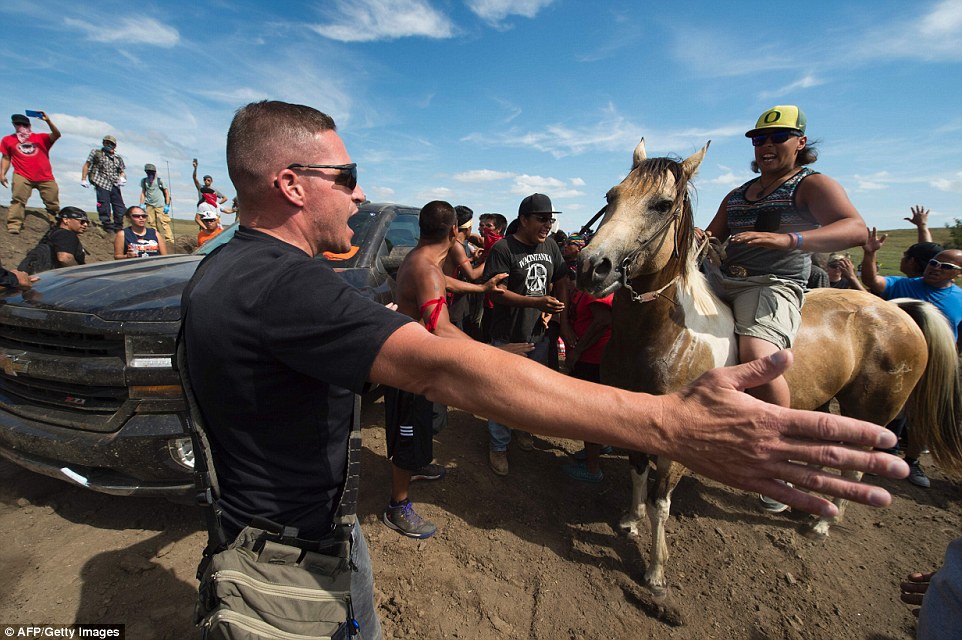
Morton County Sheriff's Office spokeswoman Donnell Preskey said four private security guards and two guard dogs were injured after several hundred protesters confronted construction crew.
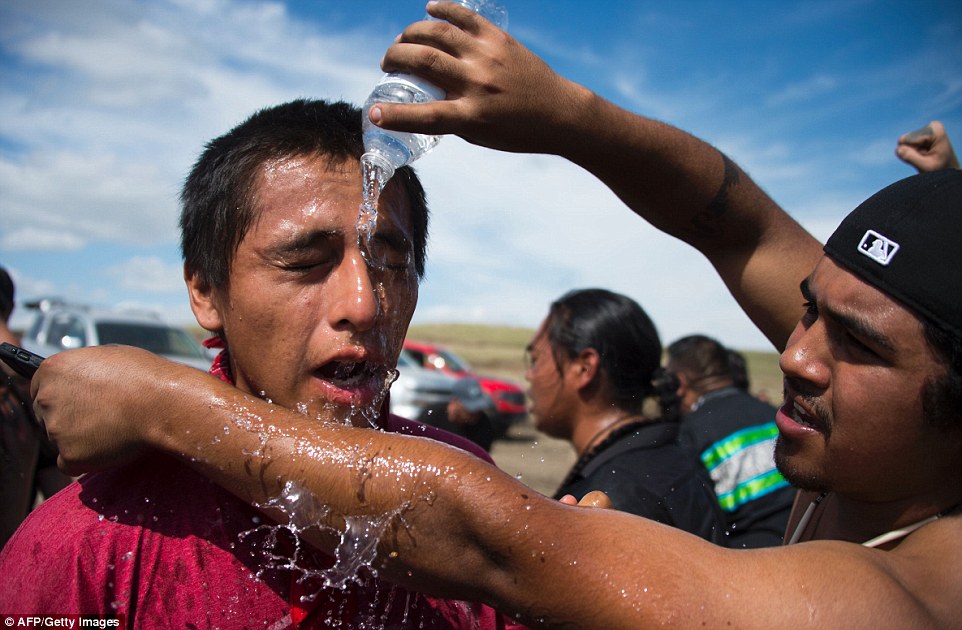
Tribe spokesman Steve Sitting Bear said protesters reported that six people had been bitten by security dogs, including a young child. At least 30 people were pepper-sprayed, he said.
Preskey said law enforcement authorities had no reports of protesters being injured.
There were no law enforcement officials at the site when the incident occurred, Preskey said. The crowd disbursed when officers arrived and no one was arrested, she said.
The incident occurred within half a mile of an encampment where hundreds of people have gathered to join the Standing Rock Sioux Tribe's protest of the oil pipeline that is slated to cross the Missouri River nearby.
The tribe is challenging the Army Corps of Engineers' decision to grant permits for Dallas-based Energy Transfer Partners' Dakota Access pipeline, which crosses the Dakotas and Iowa into Illinois, including near the reservation in southern North Dakota.
A federal judge will rule before September 9 whether construction can be halted on the Dakota Access pipeline
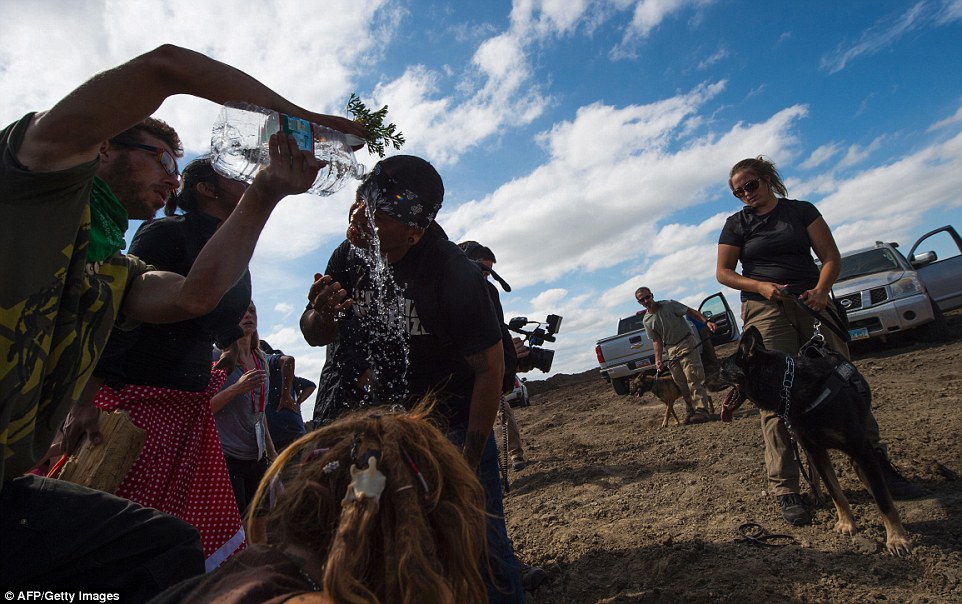
Protesters help wash out the eyes of a man after he was pepper sprayed in the face by security guards at the construction site.
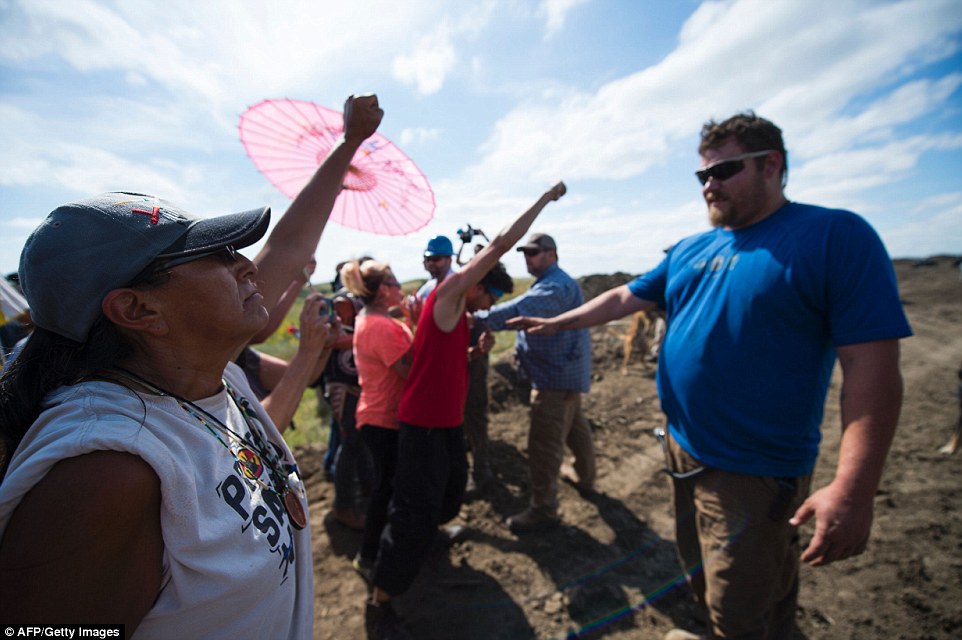
Tribe spokesman Steve Sitting Bear said protesters reported that six people had been bitten by security dogs, including a young child.
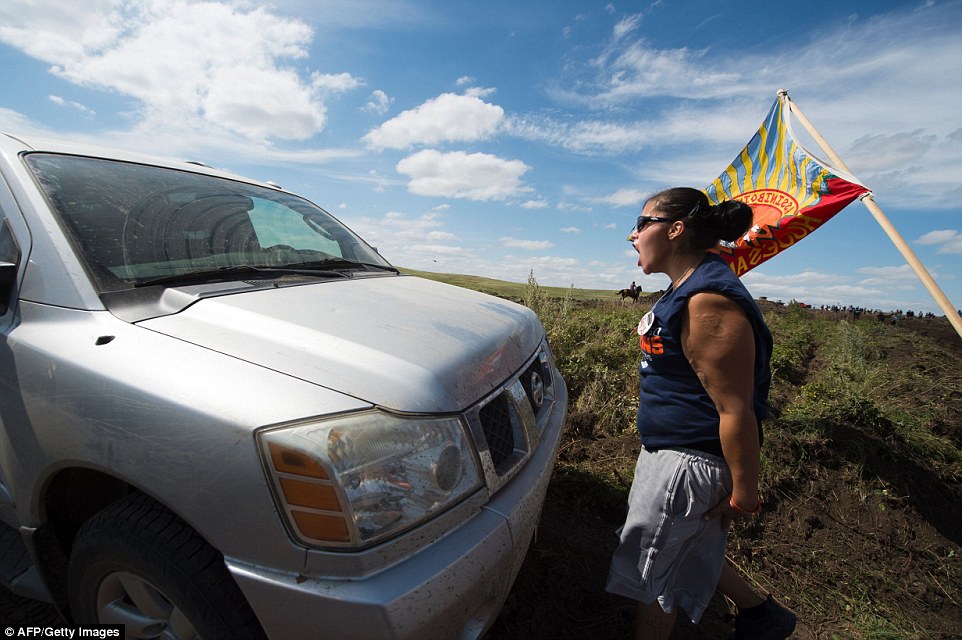
The Tribe spokesman said that at least 30 protesters were pepper sprayed during the incident, though law enforcement officials said no one was injured.
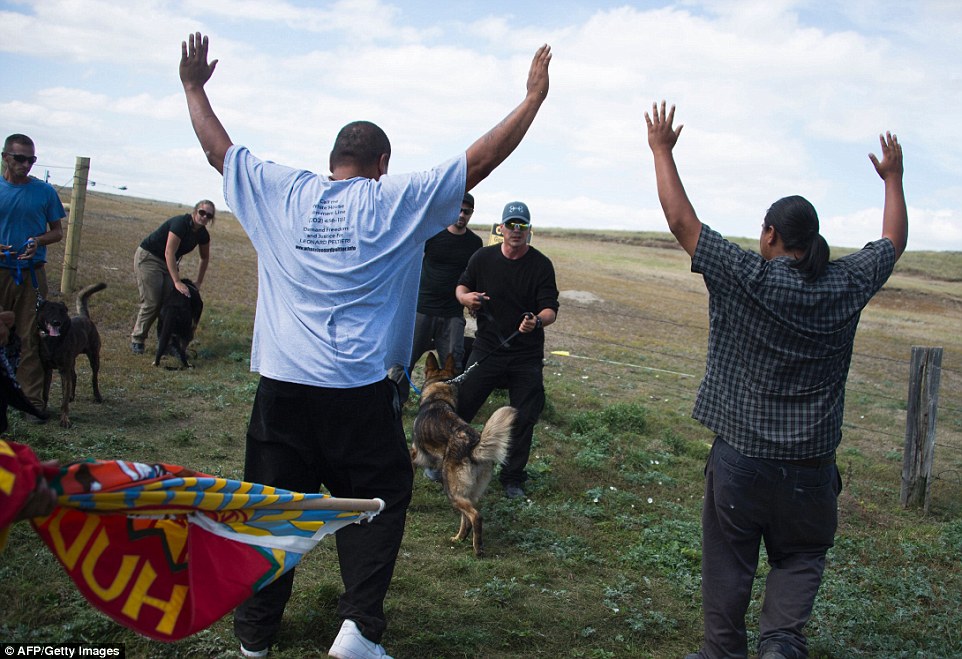
The tribe is challenging the Army Corps of Engineers' decision to grant permits for Dallas-based Energy Transfer Partners' Dakota Access pipeline
Energy Transfer Partners did not return phone calls and emails on Saturday seeking comment.
The tribe fears it's a project that will disturb sacred sites and impact drinking water for thousands of tribal members on the Standing Rock Sioux Reservation and millions further downstream.
The protest Saturday came one day after the tribe filed court papers saying it found several sites of 'significant cultural and historic value' along the path of the proposed pipeline.
Tribal preservation officer Tim Mentz said in court documents that the tribe was only recently allowed to survey private land north of the Standing Rock Sioux reservation.
Mentz said researchers found burials rock piles called cairns and other sites of historic significance to Native Americans.
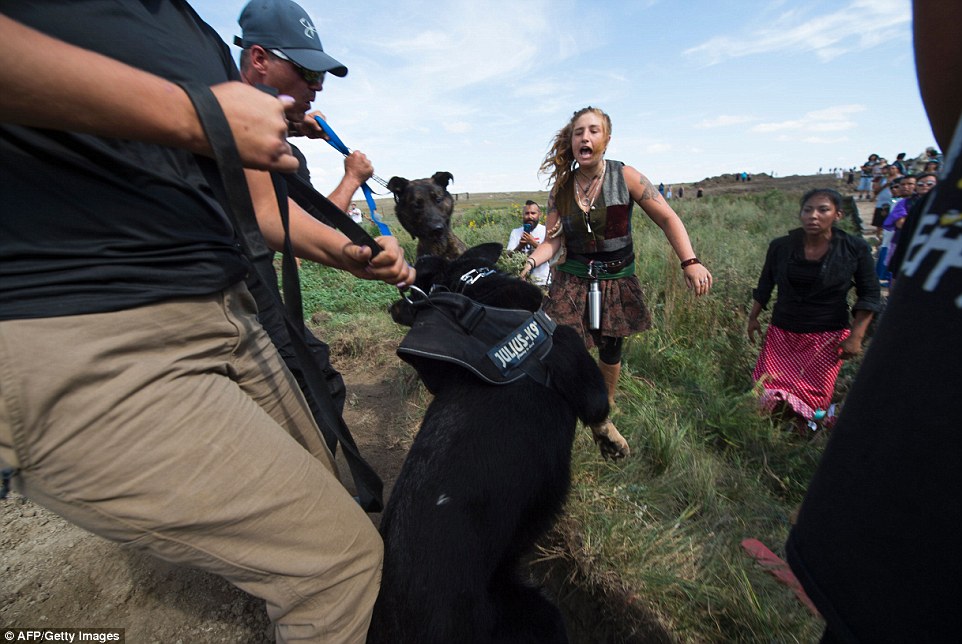
The pipeline crosses the Dakotas and Iowa into Illinois, including an area near the reservation in southern North Dakota.
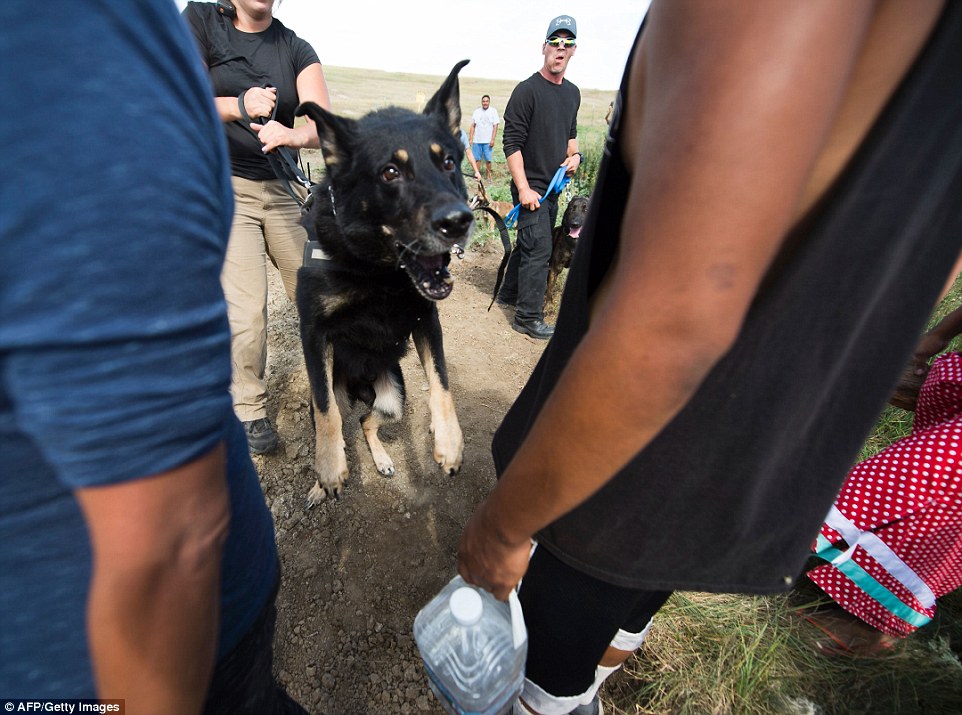
A guard dog handled by a private security guard lunges toward protestors during a demonstration by hundreds of Native American protestors and their supporters.
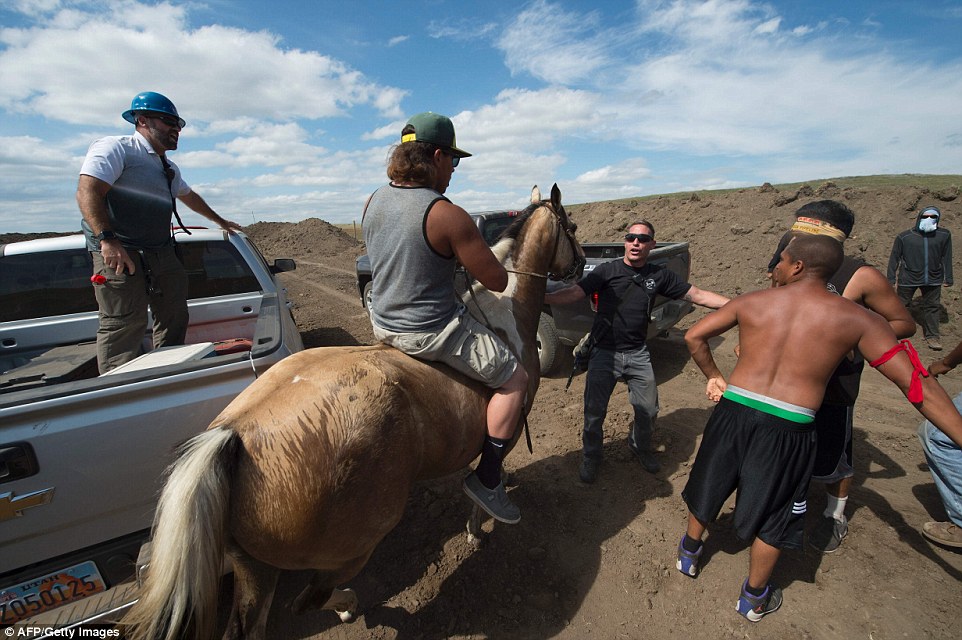
Tribe officials claim construction crews destroyed Native American burial and cultural sites on private land in southern North Dakota.
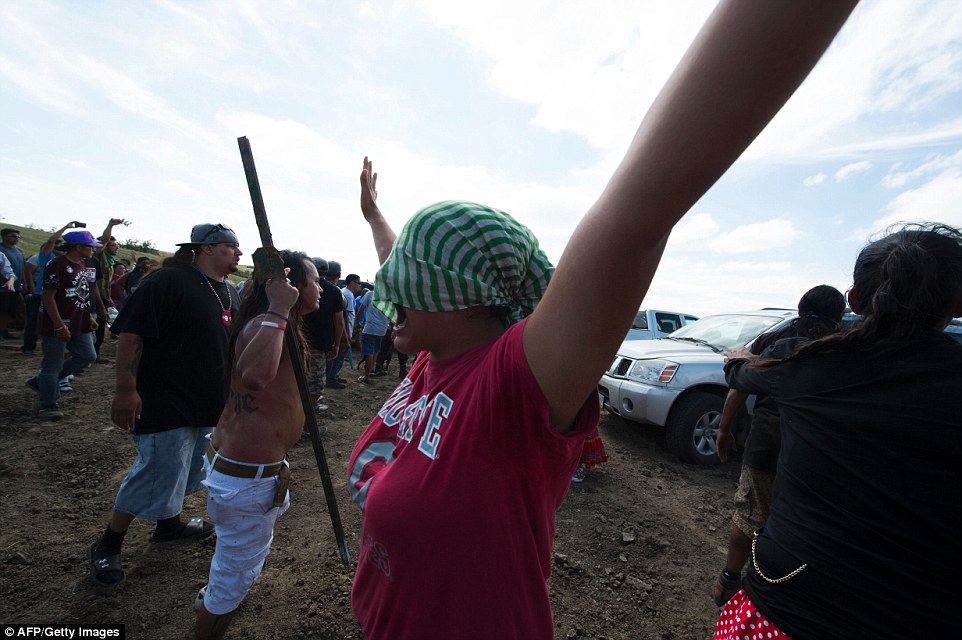
A federal judge will rule on or before September 9 whether construction can be halted on the Dakota Access pipeline.
Standing Rock Sioux chairman David Archambault II said in a statement that construction crews removed topsoil across an area about 150 feet wide stretching for two miles.
'This demolition is devastating,' Archambault said. 'These grounds are the resting places of our ancestors. The ancient cairns and stone prayer rings there cannot be replaced. In one day, our sacred land has been turned into hollow ground.'
Preskey said the company filmed the confrontation by helicopter and turned the video over to authorities. Protesters have also posted some of the confrontation on social media.
Morton County Sheriff Kyle Kirchmeier said in a statement that 'individuals crossed onto private property and accosted private security officers with wooden posts and flag poles'.
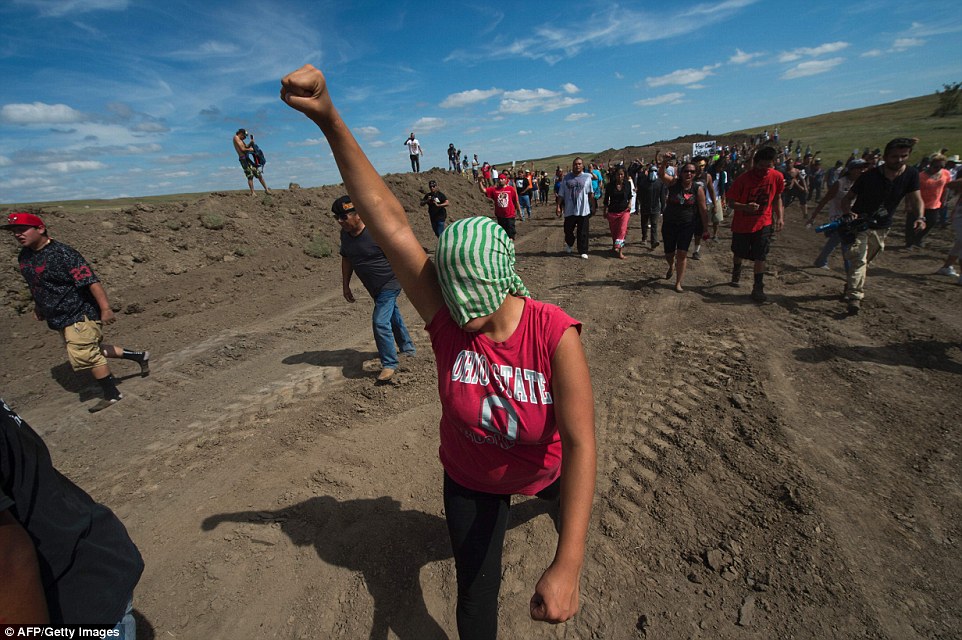
Tribal preservation officer Tim Mentz said in court documents that the tribe was only recently allowed to survey private land north of the Standing Rock Sioux reservation.
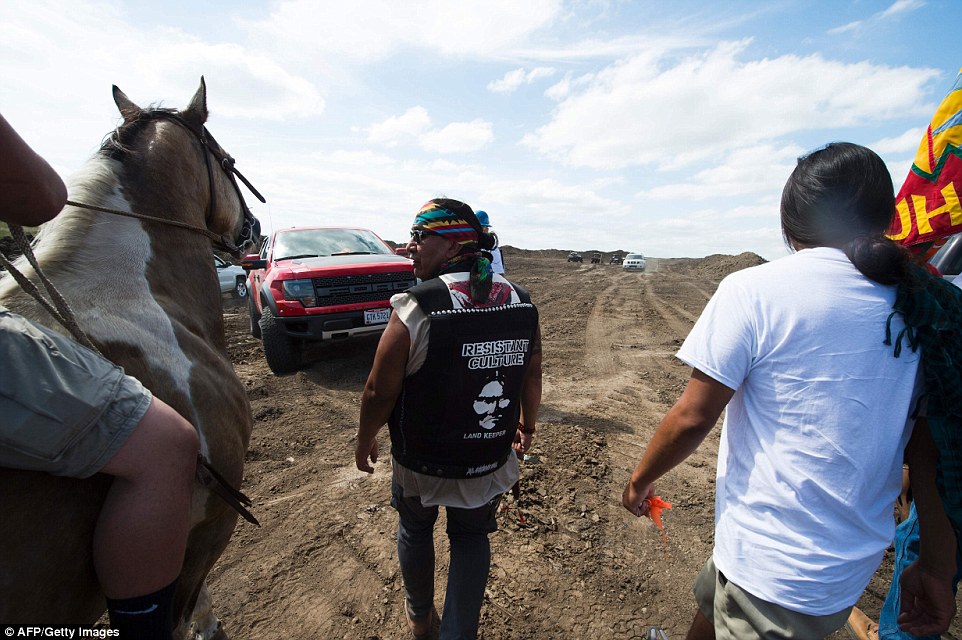
The protest Saturday came one day after the tribe filed court papers saying it found several sites of 'significant cultural and historic value' along the path of the proposed pipeline.
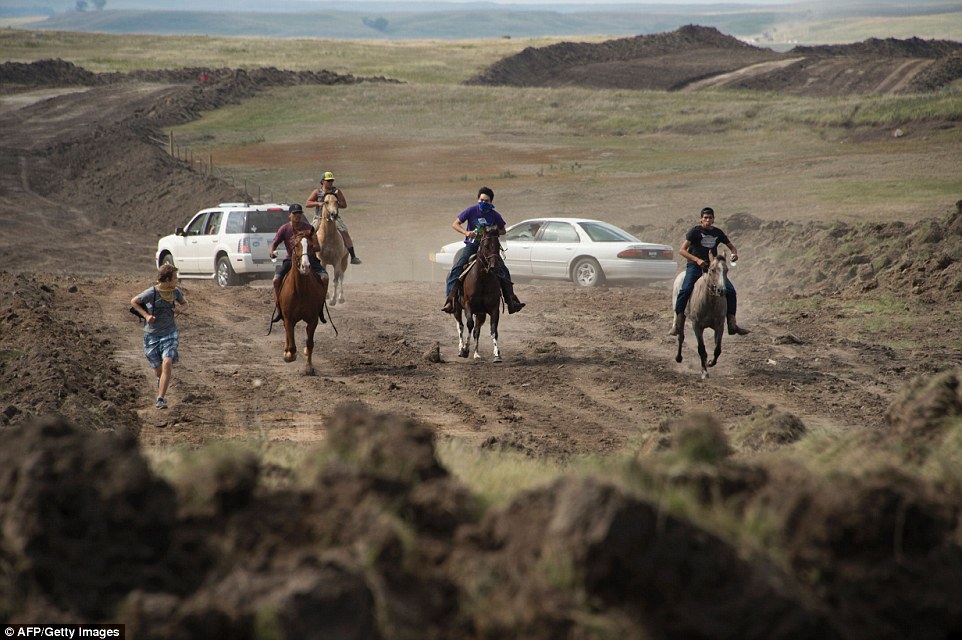
Some protesters arrived on horseback to take part in the demonstration against the pipeline. The protesters forced construction workers and security forces to retreat and work to stop.
Any suggestion that today's event was a peaceful protest, is false,' his statement said.
Archambault called the pipeline a 'historic' wrong involving tribal sovereignty and land rights.
Archambault and others also have been sued by Energy Transfer Partners for interfering with the pipeline, which will pass through Iowa, Illinois, North Dakota and South Dakota.
Former North Dakota US Attorney Tim Purdon, who is representing Archambault and other tribal leaders in that suit, said that it's nothing more than an attempt to silence the tribal leader.
'I think they think he is a voice for the people that no one can control,' Purdon said. 'From the first day I met him, I could tell he is a very serious person who really has the best interests of his people - and the people of North Dakota - at heart. What I see now is the same thing: He is focused on what he believes is best.'
Archambault has for years spoken of concerns among the leaders of North Dakota's five American Indian reservations about 'the increasing number of environmental incidents' in western North Dakota's oil patch - far from his own territory.
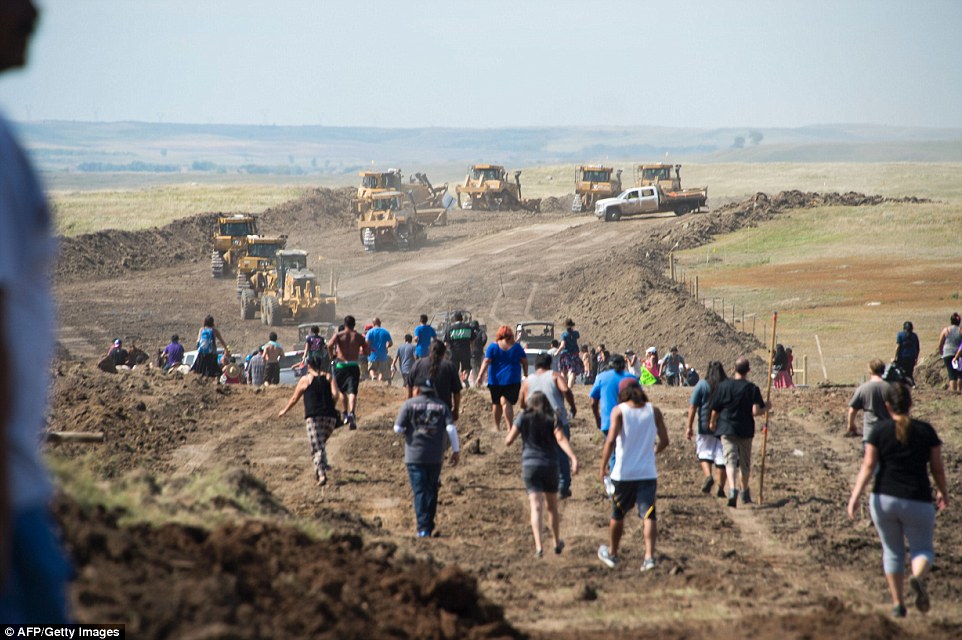
Protesters, pictured walking toward work being done on the pipeline, also fear the Dakota Access Pipeline will pollute their water.
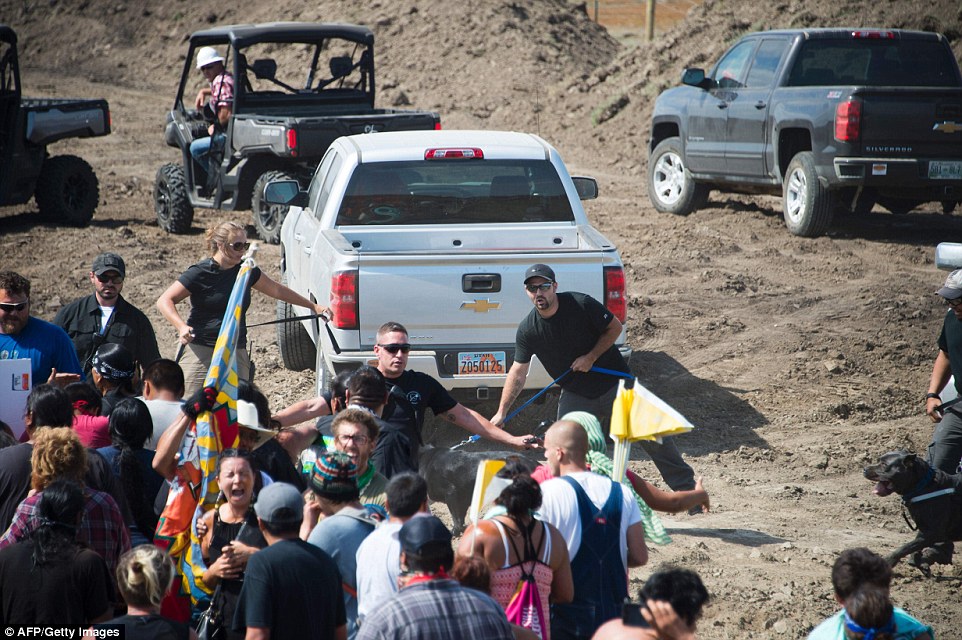
Officials said in a statement that 'individuals crossed onto private property and accosted private security officers with wooden posts and flag poles'.
He appealed to lawmakers to do more to protect public safety and the environment.
That was before his tribe was aware of the Dakota Access pipeline, for which developers have promised safeguards, noting that workers monitoring the pipeline remotely in Texas could stop any leak within three minutes.
It's not enough for Archambault, who worries a breach would destroy sacred sites and ancestral burial grounds well beyond the reservation's boundaries.
'Anything that is man-made is going to come apart,' he said, pointing to a 2013 spill in northwestern North Dakota that was among the largest inland spills in North America.
It was discovered only after a farmer got his tractor stuck in the muck while harvesting wheat; it's only half cleaned up, despite crews working around the clock since it happened, state health officials say.
Archambault has the full backing of the leader of North Dakota's oil-rich Mandan, Hidatsa and Arikara Nation.
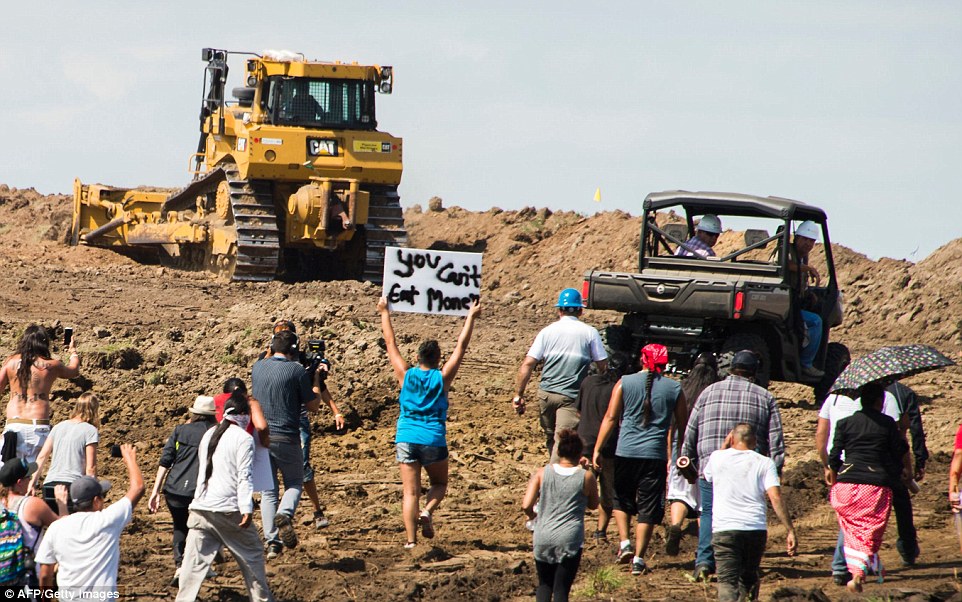
The large crowd disbursed when officers arrived and no one involved in the incident was arrested, officials said on Saturday.
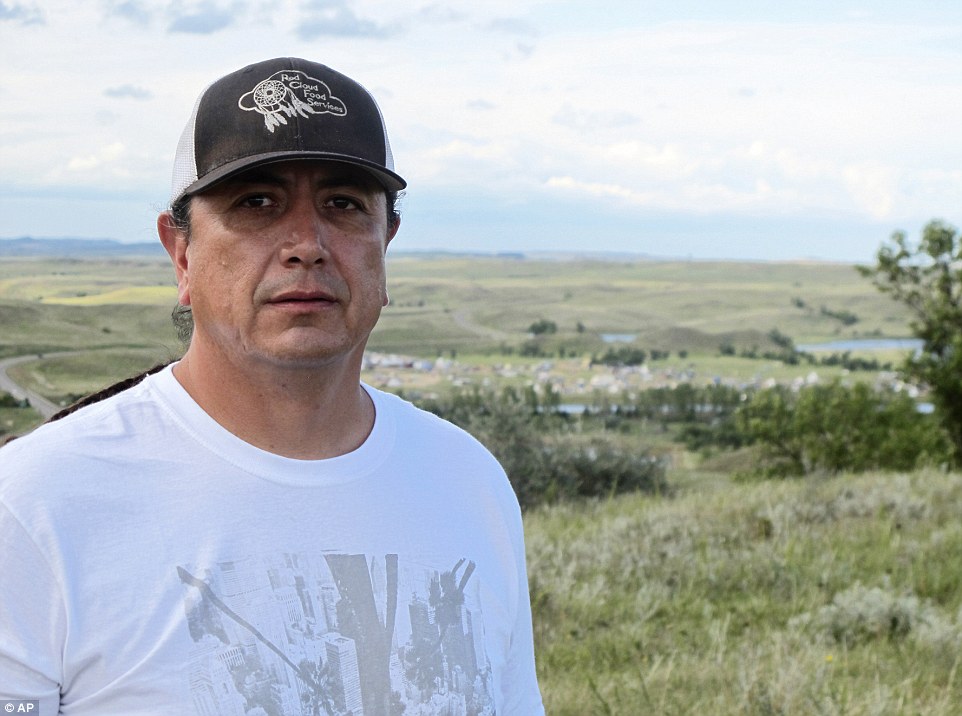
Standing Rock Sioux Chairman Dave Archambault II called the demolition in the area 'devastating', adding that 'sacred land has been turned into hollow ground'.
Standing Rock is standing for something and we're there standing with them,' Three Affiliated Tribes Chairman Mark Fox said. His reservation produces about 20 per cent of the state's daily oil output.
'We want oil production but we want it done responsibly and respectfully,' Fox said. 'Our basic position... is to figure another way around the river and the reservation. There are other ways.'
Fox called Archambault a lifelong friend who he says has become 'weary but remains strong' and is 'under a heavy burden.'
Still, Archambault is clearly buoyed by the scores of protesters who have come to help his tribe's fight. On a recent afternoon, Monte Lovejoy, a member of the Oglala Sioux tribe on the Pine Ridge Indian Reservation in South Dakota, embraced Archambault and thanked him.
'I really couldn't afford to come up here,' he told Archambault, whom he'd never met before. 'But I really couldn't afford not to, for my kids and for my people.'
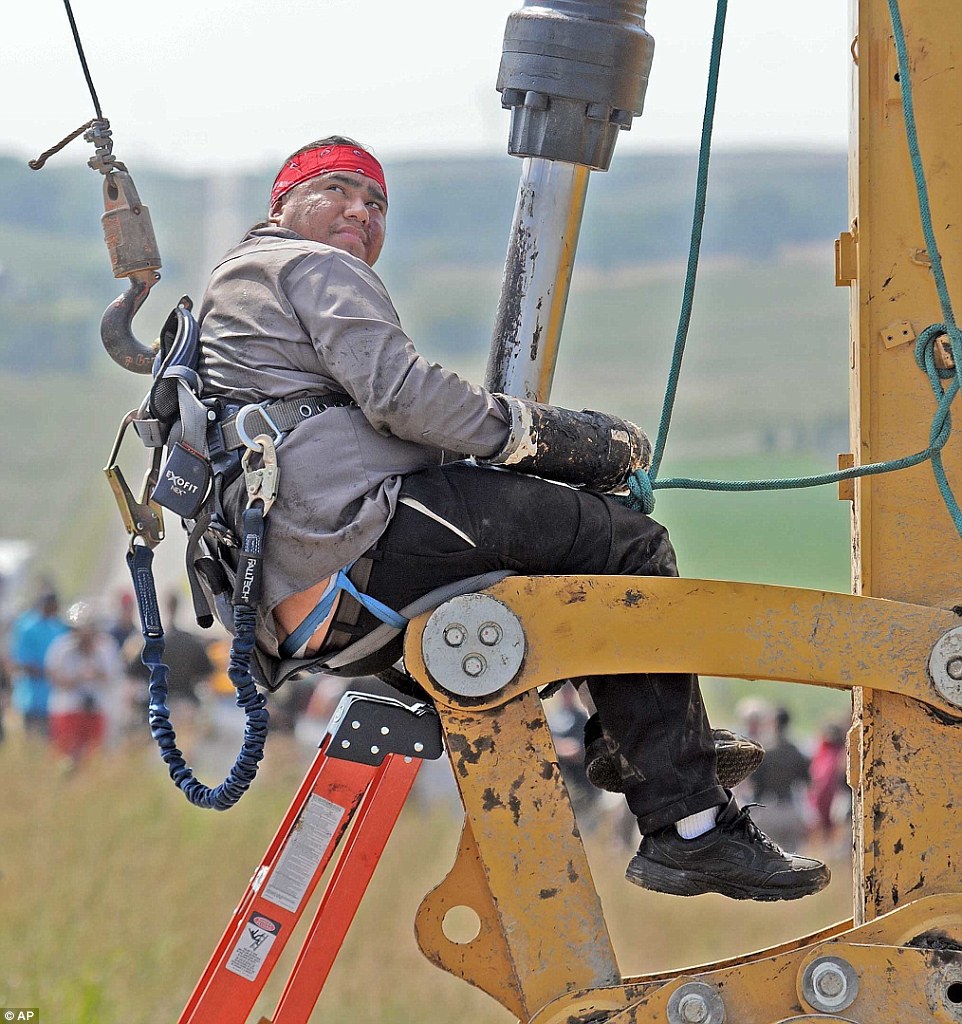
One man protested by attaching himself to heavy equipment at the site of construction of the Dakota Access Pipeline.
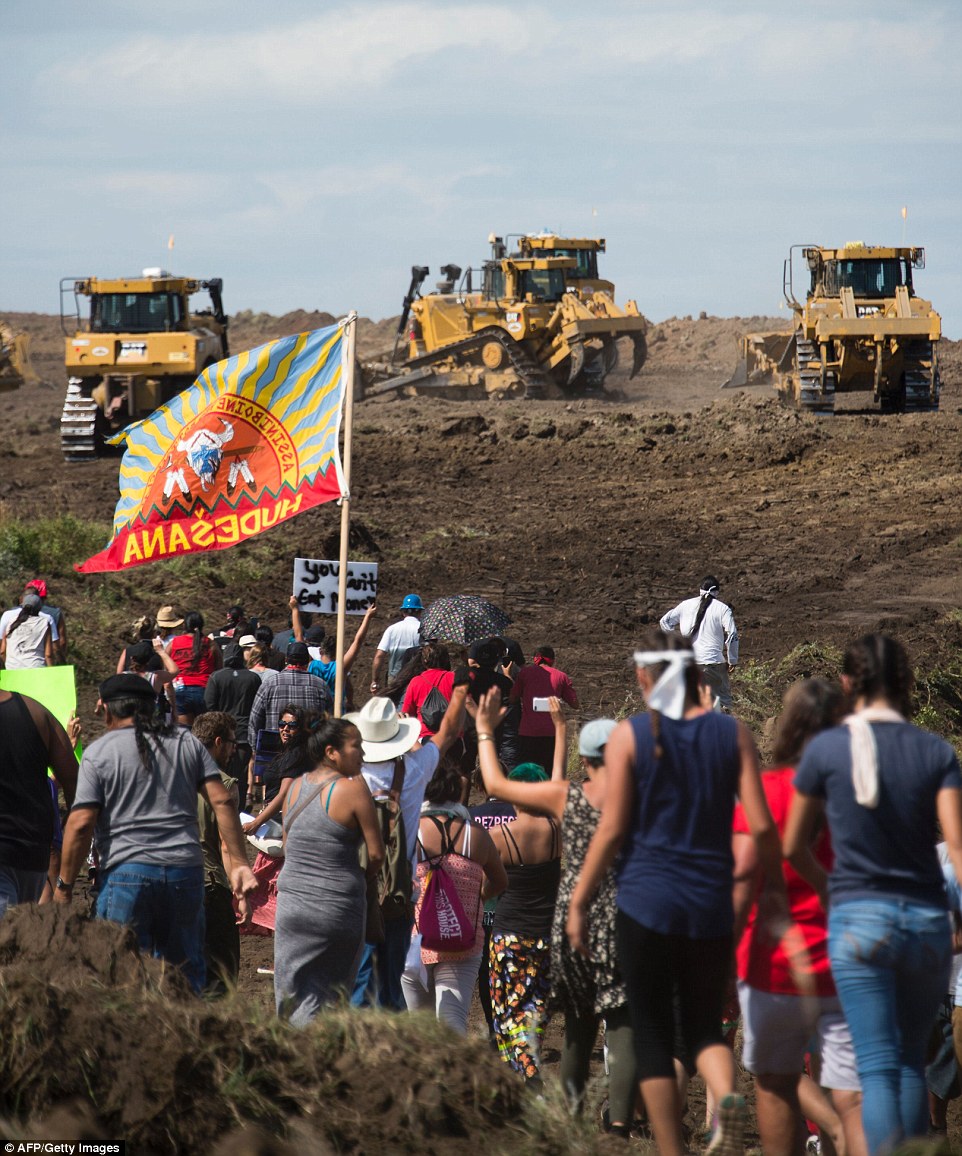
Law enforcement authorities had no reports of protesters being injured, but there were no law enforcement officials at the site when the incident occurred.
Protestors are confronted during a demonstration against oil pipeline
Violent scenes at North Dakota oil pipeline as protesters claim sacred burial grounds were destroyed by construction crews
- Four private security guards and two guard dogs were injured after a protest in southern North Dakota turned violent on Saturday
- Several hundred people were protesting the four-state, $3.8billion Dakota Access oil pipeline
- Violence came after several hundred protesters confronted construction crews at the site just outside the Standing Rock Sioux reservation
- Tribal officials say construction crews destroyed Native American burial and cultural sites on private land
- Tribe spokesman Steve Sitting Bear said protesters reported that six people had been bitten by security dogs, including a young child
- Law enforcement authorities had no reports of protesters being injured
- The crowd disbursed when police arrived and no one was arrested
A protest against a four-state, $3.8billion oil pipeline turned violent on Saturday after tribal officials say construction crews destroyed Native American burial and cultural sites on private land in southern North Dakota.
Morton County Sheriff's Office spokeswoman Donnell Preskey said four private security guards and two guard dogs were injured after several hundred protesters confronted construction crews at the site just outside the Standing Rock Sioux reservation.
One of the security officers was taken to a Bismarck hospital for undisclosed injuries. The two guard dogs were taken to a Bismarck veterinary clinic, Preskey said.

Security agents (left in blue helmet) confront protesters on the worksite for the Dakota Access Pipeline (DAPL) oil pipeline, near Cannonball, North Dakota, on Saturday.

Native American protesters and their supporters clash with security guards just outside the Standing Rock Sioux reservation.

Morton County Sheriff's Office spokeswoman Donnell Preskey said four private security guards and two guard dogs were injured after several hundred protesters confronted construction crew.

Tribe spokesman Steve Sitting Bear said protesters reported that six people had been bitten by security dogs, including a young child. At least 30 people were pepper-sprayed, he said.
Preskey said law enforcement authorities had no reports of protesters being injured.
There were no law enforcement officials at the site when the incident occurred, Preskey said. The crowd disbursed when officers arrived and no one was arrested, she said.
The incident occurred within half a mile of an encampment where hundreds of people have gathered to join the Standing Rock Sioux Tribe's protest of the oil pipeline that is slated to cross the Missouri River nearby.
The tribe is challenging the Army Corps of Engineers' decision to grant permits for Dallas-based Energy Transfer Partners' Dakota Access pipeline, which crosses the Dakotas and Iowa into Illinois, including near the reservation in southern North Dakota.
A federal judge will rule before September 9 whether construction can be halted on the Dakota Access pipeline

Protesters help wash out the eyes of a man after he was pepper sprayed in the face by security guards at the construction site.

Tribe spokesman Steve Sitting Bear said protesters reported that six people had been bitten by security dogs, including a young child.

The Tribe spokesman said that at least 30 protesters were pepper sprayed during the incident, though law enforcement officials said no one was injured.

The tribe is challenging the Army Corps of Engineers' decision to grant permits for Dallas-based Energy Transfer Partners' Dakota Access pipeline
Energy Transfer Partners did not return phone calls and emails on Saturday seeking comment.
The tribe fears it's a project that will disturb sacred sites and impact drinking water for thousands of tribal members on the Standing Rock Sioux Reservation and millions further downstream.
The protest Saturday came one day after the tribe filed court papers saying it found several sites of 'significant cultural and historic value' along the path of the proposed pipeline.
Tribal preservation officer Tim Mentz said in court documents that the tribe was only recently allowed to survey private land north of the Standing Rock Sioux reservation.
Mentz said researchers found burials rock piles called cairns and other sites of historic significance to Native Americans.

The pipeline crosses the Dakotas and Iowa into Illinois, including an area near the reservation in southern North Dakota.

A guard dog handled by a private security guard lunges toward protestors during a demonstration by hundreds of Native American protestors and their supporters.

Tribe officials claim construction crews destroyed Native American burial and cultural sites on private land in southern North Dakota.

A federal judge will rule on or before September 9 whether construction can be halted on the Dakota Access pipeline.
Standing Rock Sioux chairman David Archambault II said in a statement that construction crews removed topsoil across an area about 150 feet wide stretching for two miles.
'This demolition is devastating,' Archambault said. 'These grounds are the resting places of our ancestors. The ancient cairns and stone prayer rings there cannot be replaced. In one day, our sacred land has been turned into hollow ground.'
Preskey said the company filmed the confrontation by helicopter and turned the video over to authorities. Protesters have also posted some of the confrontation on social media.
Morton County Sheriff Kyle Kirchmeier said in a statement that 'individuals crossed onto private property and accosted private security officers with wooden posts and flag poles'.

Tribal preservation officer Tim Mentz said in court documents that the tribe was only recently allowed to survey private land north of the Standing Rock Sioux reservation.

The protest Saturday came one day after the tribe filed court papers saying it found several sites of 'significant cultural and historic value' along the path of the proposed pipeline.

Some protesters arrived on horseback to take part in the demonstration against the pipeline. The protesters forced construction workers and security forces to retreat and work to stop.
Any suggestion that today's event was a peaceful protest, is false,' his statement said.
Archambault called the pipeline a 'historic' wrong involving tribal sovereignty and land rights.
Archambault and others also have been sued by Energy Transfer Partners for interfering with the pipeline, which will pass through Iowa, Illinois, North Dakota and South Dakota.
Former North Dakota US Attorney Tim Purdon, who is representing Archambault and other tribal leaders in that suit, said that it's nothing more than an attempt to silence the tribal leader.
'I think they think he is a voice for the people that no one can control,' Purdon said. 'From the first day I met him, I could tell he is a very serious person who really has the best interests of his people - and the people of North Dakota - at heart. What I see now is the same thing: He is focused on what he believes is best.'
Archambault has for years spoken of concerns among the leaders of North Dakota's five American Indian reservations about 'the increasing number of environmental incidents' in western North Dakota's oil patch - far from his own territory.

Protesters, pictured walking toward work being done on the pipeline, also fear the Dakota Access Pipeline will pollute their water.

Officials said in a statement that 'individuals crossed onto private property and accosted private security officers with wooden posts and flag poles'.
He appealed to lawmakers to do more to protect public safety and the environment.
That was before his tribe was aware of the Dakota Access pipeline, for which developers have promised safeguards, noting that workers monitoring the pipeline remotely in Texas could stop any leak within three minutes.
It's not enough for Archambault, who worries a breach would destroy sacred sites and ancestral burial grounds well beyond the reservation's boundaries.
'Anything that is man-made is going to come apart,' he said, pointing to a 2013 spill in northwestern North Dakota that was among the largest inland spills in North America.
It was discovered only after a farmer got his tractor stuck in the muck while harvesting wheat; it's only half cleaned up, despite crews working around the clock since it happened, state health officials say.
Archambault has the full backing of the leader of North Dakota's oil-rich Mandan, Hidatsa and Arikara Nation.

The large crowd disbursed when officers arrived and no one involved in the incident was arrested, officials said on Saturday.

Standing Rock Sioux Chairman Dave Archambault II called the demolition in the area 'devastating', adding that 'sacred land has been turned into hollow ground'.
Standing Rock is standing for something and we're there standing with them,' Three Affiliated Tribes Chairman Mark Fox said. His reservation produces about 20 per cent of the state's daily oil output.
'We want oil production but we want it done responsibly and respectfully,' Fox said. 'Our basic position... is to figure another way around the river and the reservation. There are other ways.'
Fox called Archambault a lifelong friend who he says has become 'weary but remains strong' and is 'under a heavy burden.'
Still, Archambault is clearly buoyed by the scores of protesters who have come to help his tribe's fight. On a recent afternoon, Monte Lovejoy, a member of the Oglala Sioux tribe on the Pine Ridge Indian Reservation in South Dakota, embraced Archambault and thanked him.
'I really couldn't afford to come up here,' he told Archambault, whom he'd never met before. 'But I really couldn't afford not to, for my kids and for my people.'

One man protested by attaching himself to heavy equipment at the site of construction of the Dakota Access Pipeline.

Law enforcement authorities had no reports of protesters being injured, but there were no law enforcement officials at the site when the incident occurred.
Protestors are confronted during a demonstration against oil pipeline
 , I would be a little embarrassed.
, I would be a little embarrassed. 
